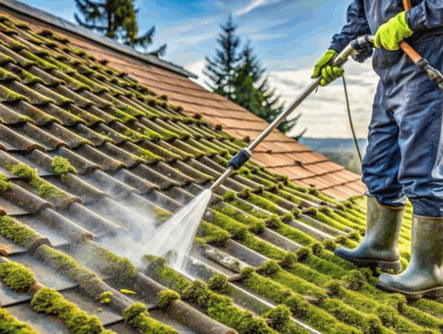Table Of Contents
- 1 What Is Pressure Washing?
- 2 What Is Roof Pressure Washing?
- 3 Why Is Roof Pressure Washing Important?
- 4 What Are The Benefits Of Roof Pressure Washing?
- 5 How Much Does It Cost To Pressure Wash A Roof?
- 6 Can I Pressure Wash My Roof Myself?
- 7 When Should I Consider Hiring A Professional?
- 8 How Often Should I Pressure Wash My Roof?
- 9 How Do I Choose The Right Pressure Washing Company?
Pressure washing is a highly effective cleaning method for maintaining both the appearance and integrity of various surfaces, including roofs. This guide examines the significance of roof pressure washing and the numerous advantages it provides to homeowners, such as moss prevention and roof moss removal. Additionally, it addresses the associated costs, evaluates the feasibility of undertaking the project independently, and outlines circumstances in which it may be advisable to engage professional services. This comprehensive resource will equip you with the essential information needed to ensure your roof remains in optimal condition through effective roof cleaning and maintenance practices.
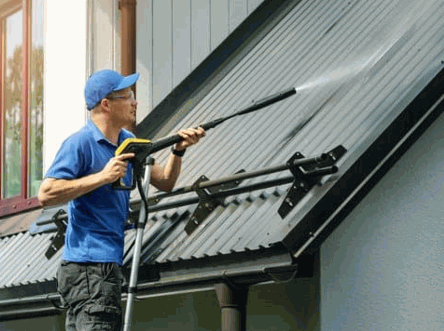
What Is Pressure Washing?
Pressure washing is a highly effective cleaning technique that utilizes high-pressure water spray to eliminate dirt, grime, mold, and other debris from various surfaces, including residential structures, driveways, and roofs. Some contractors recommend soft washing as an alternative cleaning method to protect delicate surfaces.
In Texas, where environmental conditions such as humidity contribute to the rapid growth of algae and moss on roofs, contractors frequently recommend pressure washing and soft washing as essential maintenance practices.
This method not only extends the lifespan of roofing materials but also enhances the overall curb appeal of properties, increasing their potential property values.
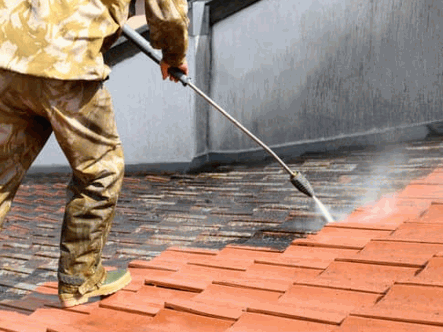
What Is Roof Pressure Washing?
Roof pressure washing is a specialized cleaning process designed to address the distinct requirements of various roof types, effectively eliminating stubborn stains caused by moss, algae, and other organic substances that can compromise the integrity of the roof. This technique is particularly beneficial for homeowners seeking to maintain both the aesthetic appeal and longevity of their roofs, as it employs specific methods tailored to different roofing materials and sizes, including considerations of roof dimensions.
This service presents numerous advantages, ensuring that the roof remains in optimal condition while considerably enhancing its lifespan. During the pressure washing process, professionals evaluate the type of roofing material—whether asphalt shingles, tile, metal, or flat roofs—to determine the most effective cleaning method. Each type of roofing material presents unique challenges and requires varying levels of pressure, with cleaning chemicals sometimes used for enhanced effectiveness:
- Asphalt Shingles: Typically cleaned with low pressure to prevent potential damage.
- Tile Roofs: Generally more durable but can still benefit from gentle washing techniques.
- Metal Roofs: Capable of withstanding higher pressure settings for effective cleaning.
- Flat Roofs: Often necessitate specific techniques to manage water drainage efficiently.
Regular maintenance of a roof through pressure washing is essential, as it helps to prevent the accumulation of harmful elements that could lead to costly repairs in the future. By incorporating this cleaning service into a routine maintenance schedule, the longevity of the roof can be significantly improved, reducing the need for premature roof repair.
Delve into: How To Clean Roof From Moss
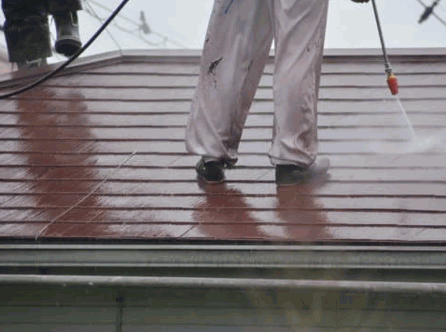
Why Is Roof Pressure Washing Important?
Roof pressure washing is essential for various reasons, primarily due to its role in maintaining the overall condition of a roof. It prevents damage caused by the growth of moss and algae, thereby extending the lifespan of roofing materials.
Regular cleaning not only improves the aesthetic appeal of a property but also helps avoid expensive repairs that can arise from neglecting roof maintenance. Incorporating roof vent cleaning and gutter cleaning into the routine can further enhance results. Furthermore, it contributes to the reduction of cleaning costs over time.
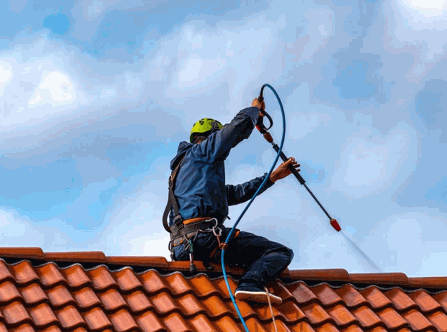
What Are The Benefits Of Roof Pressure Washing?
The advantages of roof pressure washing extend beyond mere aesthetics; this maintenance practice substantially improves curb appeal, prolongs the lifespan of roofing materials, and acts as a proactive measure to prevent damage and leaks. Additionally, it supports proper water drainage and prevents issues like blocked gutters.
By effectively removing harmful substances such as moss and algae, homeowners can maintain their roofs in optimal condition, which is crucial for both functionality and visual appeal.
Increases Curb Appeal
One of the most immediate advantages of roof pressure washing is its capacity to significantly enhance curb appeal, as a clean roof can transform the overall aesthetic of a home. This enhancement is particularly evident in neighborhoods where residences are closely situated, as any grime or discoloration can detract from the visual harmony of the area.
When a property exhibits clarity and cleanliness, it not only attracts the attention of passersby but also instills a sense of pride among homeowners. The effects of roof cleaning extend beyond mere aesthetics; they can also substantially increase property values. For example, a homeowner in a suburban community reported receiving multiple offers above the asking price within days of pressure washing their roof. Such transformations are not solely superficial; they contribute to a more appealing neighborhood environment.
- Before: A dull, moss-covered roof.
- After: A radiant, like-new roof that complements the property.
These improvements can evoke a positive psychological response in both residents and potential buyers, reinforcing the notion that cleanliness fosters a sense of community and well-being. Moreover, regular roof raking and cavity cleaning can contribute to maintaining a pristine environment.
Extends The Lifespan Of The Roof
Regular roof pressure washing can significantly extend the lifespan of roofing materials by removing harmful elements such as moss and algae, which can lead to deterioration over time. By investing in this cleaning method, homeowners can maximize the durability of their roofs and reduce the likelihood of premature repairs or replacements.
It is important to recognize that different roofing materials respond uniquely to neglect and maintenance practices. For example, asphalt shingles can last approximately 20 years with proper maintenance; however, this lifespan can be reduced by nearly 50% without routine care. Likewise, while metal roofing is known for its durability, it is susceptible to corrosion and rust when not regularly cleaned, resulting in a considerably shorter lifespan.
Statistics indicate that regular maintenance can increase the lifespan of asphalt shingles by up to 30% and nearly 50% for metal roofs when complemented with periodic pressure washing. The long-term financial benefits of such maintenance practices are substantial; homeowners can save thousands of dollars in repair costs while potentially increasing property value.
By incorporating pressure washing into their routine maintenance, homeowners not only protect their investment but also enhance the overall resilience of their roofs.
Prevents Damage And Leaks
Preventing damage and leaks is a primary benefit of roof pressure washing, as this process effectively removes debris and organic growth that can compromise the integrity of the roof. By ensuring that roofs are clean and free of obstructions, homeowners significantly reduce the risk of water infiltration, which can lead to expensive repairs and structural issues.
Neglecting routine maintenance can result in considerable problems, such as cracked shingles and blocked gutters that trap moisture, potentially leading to the need for roof repair. For example, the growth of algae and moss not only diminishes the roof's visual appeal but also retains water, thereby accelerating decay and increasing the likelihood of leaks. The application of a roof sealant can further protect against such issues.
By incorporating pressure washing into a regular roof maintenance regimen, these issues can be addressed proactively. Effectively removing contaminants helps to extend the lifespan of roofing materials, leading to several advantages, including:
- Increased durability of shingles
- Enhanced aesthetic appeal
- Improved water drainage
Ultimately, this preventative measure can result in substantial savings for homeowners in terms of repair costs.
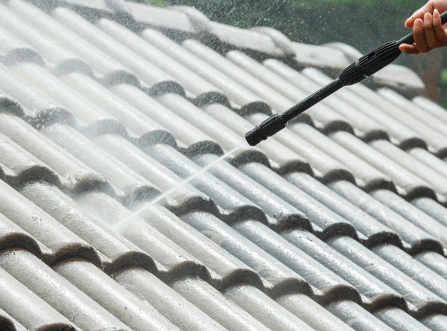
How Much Does It Cost To Pressure Wash A Roof?
The cost of pressure washing a roof can vary significantly based on several factors, including the size, type, and condition of the roof. Homeowners can anticipate an average total cost calculated on a per-square-foot basis.
By comprehensively understanding these factors, property owners can more effectively budget for roof maintenance and cleaning expenses, including average cost considerations, while ensuring that quality is not compromised.
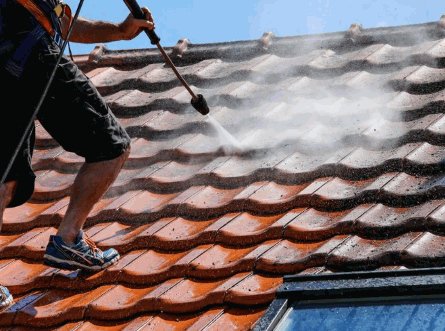
Factors That Affect The Cost
Several factors influence the cost of pressure washing a roof, including roof size, material, and condition, all of which play a significant role in determining the final price. Understanding these factors can assist homeowners in making informed decisions when considering roof cleaning services, such as evaluating the benefits of pressure washing versus soft washing.
The roof size, typically measured in square feet, is the most apparent factor affecting the overall cost. Larger roofs will inherently require more time and resources for cleaning, resulting in increased labor and material expenses.
The type of roof material—such as asphalt shingles, tile, or metal—adds another layer of complexity to the pricing structure. Each material necessitates specific cleaning methods and chemicals, which can vary considerably in cost.
The existing condition of the roof is also critical; roofs that are heavily stained or have substantial algae growth may require additional treatment, including cleaning chemicals like bleach and water solutions, thus increasing the final bill.
- Expert Insights: Industry professionals, such as those from HomeGuide, RCIA, and ARMA, often recommend obtaining multiple quotes from contractors to compare services and pricing.
- Condition Importance: A comprehensive inspection can help identify any underlying issues that may need attention, potentially resulting in cost savings in the long run, and may also reveal the need for solar panel cleaning or deck cleaning as part of a holistic property maintenance approach.
Average Cost For Pressure Washing A Roof
The average cost for pressure washing a roof generally ranges from $200 to $600, depending on the square footage and specific requirements of the roof condition. This price range provides homeowners with a foundational understanding for budgeting this essential maintenance task according to HomeGuide and RCIA guidelines.
When evaluating the overall investment, it is important to consider various factors that can influence the final price:
- Size: Larger roofs inherently require more time and resources, resulting in higher costs.
- Type of material: Different roofing materials, such as asphalt shingles or tiles, may necessitate distinct cleaning methods and associated pricing.
- Location: The geographic location can significantly affect labor costs.
Additionally, services such as moss removal or sealant application can considerably impact the overall budget. For instance, the cost for moss removal may range from $100 to $250, while the application of sealant could add an additional $200 to $300 to the total expense, as suggested by ARMA.
Consequently, it is advisable for homeowners to obtain itemized quotes to ensure transparency regarding costs and the necessary maintenance for their roofs.
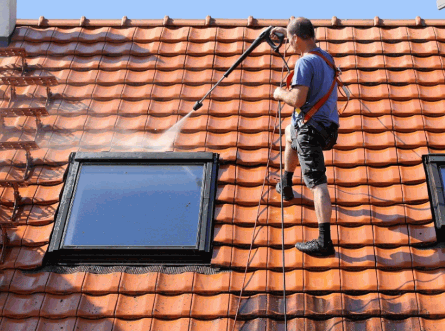
Can I Pressure Wash My Roof Myself?
Homeowners often inquire about the feasibility of pressure washing their roofs independently. While this task is indeed possible, it is imperative to consider essential safety precautions, equipment requirements, and the potential need for roof cavity cleaning prior to proceeding.
Possessing the appropriate tools and knowledge is crucial, as it can significantly impact the outcome of the cleaning process and mitigate the risk of damaging the roof or incurring personal injury.
Safety Precautions
Before undertaking DIY roof pressure washing, it is imperative to observe several safety precautions to prevent accidents or injuries during the cleaning process. This includes the use of protective gear, ensuring stable footing, and assessing the roof's condition to avoid falls or equipment-related incidents.
For homeowners intending to perform this challenging task, implementing a series of specific actions to enhance safety is crucial. First and foremost, the use of appropriate protective gear—such as non-slip footwear, helmets, and gloves—is essential. These items significantly reduce the risks associated with both height and wet surfaces.
- Conduct a thorough inspection of the roof for any signs of damage prior to commencing work.
- Utilize a sturdy ladder that extends at least three feet above the roofline.
- Employ safety harnesses when navigating particularly steep sections of the roof.
- Always have a partner present to provide assistance and support in case of emergencies.
By adhering to these precautions and maintaining a safety-first approach, homeowners in Texas and beyond can effectively mitigate the potential risks associated with roof pressure washing.
Equipment And Supplies Needed
In preparation for DIY roof pressure washing, it is essential to possess the proper equipment and supplies to achieve effective cleaning results while ensuring safety. Key items necessary for this task include a pressure washer, suitable nozzles, safety gear, and, depending on the specific requirements of the roof, cleaning chemicals specifically formulated for the removal of moss and algae.
To commence, the pressure washer serves as the core of the operation, supplying the requisite water pressure to eliminate dirt and debris. It is advisable to select a model with adjustable pressure settings, enabling the user to accommodate various surfaces without causing damage, thereby optimizing roof cleaning techniques.
Furthermore, investing in a selection of nozzles is important, as each nozzle produces different spray patterns; wider sprays are appropriate for delicate materials, while narrower sprays effectively target stubborn stains. Safety gear, which includes gloves, goggles, and a protective mask, is crucial for ensuring safety during the operation.
- Roof Cleaning Chemicals: These are vital for addressing tough stains from moss and algae, ensuring that they are effectively dissolved rather than merely washed away.
- Extension Wands: These tools facilitate safe and efficient cleaning of hard-to-reach areas.
- Surface Cleaners: These attachments can cover larger areas and provide an even finish.
Utilizing appropriate chemicals tailored to specific roof materials not only enhances cleaning efficiency but also extends the lifespan of the roof. For example, gentle cleaners are suitable for asphalt shingles, whereas more potent solutions are necessary for metal roofs, highlighting the importance of careful selection and application techniques.
Step-by-Step Guide For DIY Roof Pressure Washing
A step-by-step guide for DIY roof pressure washing can assist homeowners in navigating the process effectively, ensuring they achieve clean results without causing damage to their roofs.
This comprehensive approach not only emphasizes safety but also addresses the specific requirements of various roofing materials, making it accessible for anyone to follow. The importance of preparation cannot be overstated, as it establishes the foundation for a successful cleaning experience.
Homeowners should begin by gathering essential tools and materials, including a pressure washer, appropriate cleaning solution, safety gear, and a sturdy ladder. The following outline provides a brief overview of the necessary steps:
- Preparation: Clear the area of debris and ensure that safety equipment is in place.
- Washing Process: Employ a systematic method to eliminate dirt, moss, and algae, ensuring a thorough cleaning.
- Aftercare: Rinse thoroughly to remove any residue from cleaning agents and inspect the roof for any potential damage.
By adhering to these steps, homeowners can ensure a thorough and safe roof-washing experience that enhances both the longevity and aesthetic appeal of their roofs.
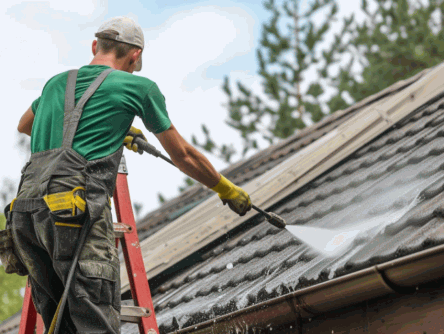
When Should I Consider Hiring A Professional?
Although some homeowners may consider undertaking roof pressure washing as a do-it-yourself project, there are particular situations in which it is advisable to engage a professional. This is especially true when dealing with complex roofing materials or when the homeowner lacks experience inappropriate cleaning techniques.
Professional contractors possess the necessary expertise and specialized equipment, to ensure a safe and comprehensive cleaning process.
Complex Roofing Materials
Certain complex roofing materials, such as slate, tile, or metal roofs, necessitate specialized knowledge and techniques that often exceed the capabilities of the average homeowner. In such instances, engaging a professional for roof cleaning is advisable to ensure that the unique characteristics of these materials are effectively addressed without risking damage.
Different roofing materials present distinct challenges that require specialized expertise. For example, slate roofs are not only costly but also brittle, meaning that inadequate care during the cleaning process may lead to cracking or dislodging of the slates. Similarly, tile roofs can accumulate debris and moss in ways that if not properly managed, may result in water leaks or other significant structural issues. Furthermore, metal roofs can experience corrosion when exposed to harsh cleaning agents, leading to expensive repairs.
- Slates require gentle handling to prevent breakage.
- Tiles necessitate careful assessment to avoid water intrusion and damage.
- Metal surfaces demand the use of non-corrosive products to maintain their integrity.
Thus, the importance of professional expertise cannot be overstated, particularly as improper cleaning practices can result in irreversible damage and increased costs over time.
Lack Of Experience Or Equipment
If a homeowner lacks the experience or necessary equipment for effective roof pressure washing, it is often advisable to hire a professional who can execute the task safely and efficiently. Professionals are equipped with specialized tools and possess the training required to manage the complexities of pressure washing without risking damage to the roof or personal injury.
While many individuals may contemplate undertaking roof washing as a DIY project, the reality is that improper techniques can result in significant risks, including:
- Damage to roofing materials
- Increased likelihood of mold and moss growth
- Injury due to falls or equipment mishaps
By engaging an expert, homeowners can derive considerable benefits. These professionals not only possess the experience necessary to perform the job correctly but also have access to:
- High-quality cleaning agents specifically designed for various roofing materials
- Advanced pressure washing equipment engineered for safe operation
- A comprehensive understanding of environmental regulations to safeguard surrounding areas
Ultimately, selecting a qualified roof washing service ensures the roof's longevity and provides peace of mind, knowing that the job will be executed properly.
Time Constraints
Time constraints can significantly influence the decision to engage a professional service for roof pressure washing, as this process tends to be both time-consuming and labor-intensive. Professionals possess the expertise to complete the task more efficiently, enabling homeowners to concentrate on other priorities while ensuring that their roofs receive proper roof-cleaning maintenance.
For numerous individuals juggling work, family, and various responsibilities, dedicating an entire weekend to roof cleaning may not be a practical option. The task entails not only pressure washing but also implementing safety measures, setting up equipment, and addressing potential repairs, all of which can require far more time than initially anticipated. Therefore, hiring experts liberates valuable time that homeowners can redirect toward their families or personal interests.
A recent testimonial from a satisfied client illustrates this point I thought I could clean my roof myself, but after spending half a day on just prep work, I opted for professionals. They finished the job in two hours!" This experience resonates with many others and highlights several key benefits.
- Rapid completion of tasks
- Enhanced peace of mind knowing safety protocols are strictly followed
- High-quality results backed by professional experience
Engaging professional services for roof cleaning not only improves efficiency but also allows homeowners to enjoy their well-deserved leisure time without the burden of labor-intensive chores.
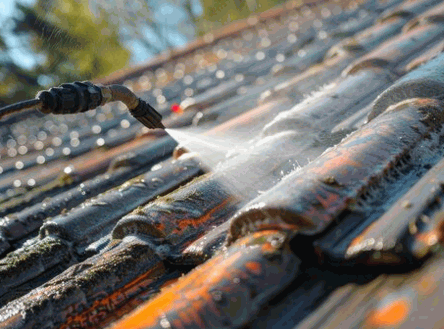
How Often Should I Pressure Wash My Roof?
Determining the appropriate frequency for pressure washing a roof is essential for effective roof maintenance and moss prevention. General recommendations advise cleaning every 1 to 3 years, depending on environmental factors such as climate and surrounding vegetation. Regular cleaning is vital for maintaining the integrity and appearance of the roof, ultimately extending its lifespan.
The specific frequency of cleaning can be influenced by various factors that warrant careful consideration. For example, in regions like Texas with frequent rainfall, roofs may require more regular washing due to the increased moisture that promotes mold and algae growth. Conversely, in climates characterized by prolonged drought periods, cleaning may be necessary less frequently.
- Roof Material: Different roofing materials, such as asphalt shingles, tile, or metal, may also dictate the frequency of cleaning. Asphalt roofs, for instance, tend to accumulate algae more rapidly compared to tile roofs.
- Surrounding Foliage: Trees and shrubs in proximity to the property can contribute to the accumulation of debris on the roof, making it essential to perform cleanings more frequently to prevent organic growth.
- Maintenance Schedule: Homeowners should establish a maintenance schedule that aligns with local weather patterns and the specific characteristics of their roofing material to ensure optimal care.
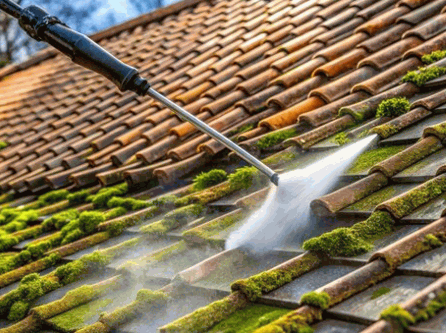
How Do I Choose The Right Pressure Washing Company?
Selecting the appropriate pressure washing company is critical for achieving effective roof cleaning and preserving the integrity of roofing materials. Homeowners should take into account various factors, including the company's reputation, customer reviews, and the range of services provided, as advised by industry contractors.
Plus these key considerations, it is imperative for homeowners to conduct comprehensive research on potential service providers. Verification of credentials is a crucial step; this involves confirming that the company is licensed and certified to perform pressure washing services. Additionally, ensuring that the company possesses liability insurance is important, as it protects homeowners from potential damages during the cleaning process.
As homeowners evaluate their options, it is essential to pay close attention to feedback from previous clients, as this can offer invaluable insights into the quality of service provided. Consulting resources like RCIA (Roof Cleaning Institute of America) can also provide guidance.
- Requesting detailed quotes is recommended to get a good idea of pricing structures.
- Inquiring about the specific techniques and equipment used is also advisable, as methods can vary significantly among providers.
By employing these strategies, homeowners can foster trust and increase the likelihood of a satisfactory outcome in their roof maintenance endeavors. Additionally, referring to standards set by organizations such as ARMA (Asphalt Roofing Manufacturers Association) can ensure best practices are followed.
